Diana Kupke Writes

The Early Years
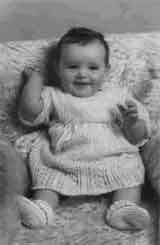
Studio portrait of baby Diana about six months old
Chronologically speaking the birth of the baby is the beginning. My memories of this time are nil but I had a 23 year old uncle, a devoted keeper of a private diary, to provide commentary about the event.
I was born on October 3, 1944 at a private hospital called Hopetoun in Elsternwick in Melbourne. My mother said my birth was difficult, she had to have a general anaesthetic, and I was a forceps baby. Here are some sections from Lester's diaries. I don't know why he wrote October 1 as I was born on the third of the month. A true Libran. Even when I changed my birthday many years later to 26 September, I made sure I remained true to my star sign.
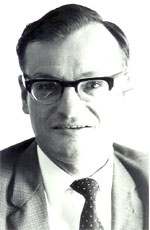
Lester Dudley as a young man. Probably photographed soon after he began work for Meat Control during WW2.
Lester's Diary - October 1 1944
Belle rang me on Tuesday afternoon (October 3) to say Merl had a daughter. Tom, (Diana's father), landed over about 6, as promised, to find I know that Diana Lynette had come into this life. I'll be able to see Merl on Sunday, at the hospital, also I hope, my niece.
Tuesday October 10
On Friday I visited Tom. He was quite pleased with life. Diana weighed six pounds seven ounces and both were well. The tramways have applied for him to the Manpower, and when he goes back he'll put in his application for a discharge. (Tom was with the RAAF).
I woke at about 8 on Sunday morning and then suddenly found it was 11. This was my worst sleep in as I usually get up about 10. I had a bath before dinner (probably the midday meal) and had not finished it when Tom came. Mrs Niddrie (Lester's landlady) had invited him over for dinner.
We left about 25 to 3. The day was warm, windy and dull, and I took my coat in case it turned bad during the night, as I was going on to Grandma's. As usual I was beaten to the fare (tram conductors knew Lester was Tom's brother-in-law) and rode free to Elsternwick. Merl looked well and happy. Shortly afterwards Leslie (cousin) and Ron came in. Leslie is going to have a baby in January. I didn't have a chance to slip my pound [pound note, his present] to Merl, till the others had gone to the nursery door, to which the sister was bringing Diana. I followed them, and had a ten-second glimpse of which my one dim memory is of tightly shut eyes amid plenty of muffling.
Sunday October 15
I saw Merl on Wednesday night. Her sister-in-law Mrs Giacometti and niece May (or Thelma, the names are very much interchanged) came there soon afterwards, too. They left before I did and Merl successfully begged me a look at Diana. I had a good look. What I saw was a comically-bewildered, clear-skinned, slightly screwed up-faced little baby, turning blank eyes from voice to voice. Our little Diana. Life is a very new affair for her.
Tuesday October 24
On Friday night I went over to see Merl and Diana at 9 Chloris Crescent, and again on Sunday. Diana, like all new babies, so far as I'm concerned, is decidedly not beautiful. However, since she's my niece, her tiny face is quaintly attractive. There is an almost continual wrinkle between her ever moving deep blue eyes, and she unselfconsciously crumples up her face in laughable ways, but her expression on the whole is at once alive and placid. She takes this world calmly. (Well that didn't last, did it?)
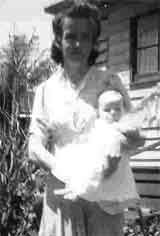
Merlyn with her new baby, Diana. The photo was taken outside the boarding house at Chloris Crescent, South Caulfield
Back to Diana in my own words
So there we have Diana Lynette Mann, born on the 3rd of October 1944, with the second world war on its last legs. You are now privy to my early days and the researching was easy, although not necessarily the living as my father often said I cried for the first six weeks of my life. Apparently I was starving because my mother didn't have enough milk. And they kept me in a drawer! Top of course, and I hope it was open at all hours.
I knew I spent my first year or two living in a boarding house at Chloris Crescent, South Caulfield and although I often dream of Chloris Crescent, all green and leafy, it was only in mid 2003 that it occurred to me to look up where it was on the internet, to discover I would have walked past it thousands of times or been past it in a tram, and it was only a couple of blocks from where I spent the first 21 years of my life. I never went there, never saw where I started off. When my mother died in April 2005 I made a fast trip to Chloris Crescent, just a block from the funeral parlour, but discovered the original house was gone and had been replaced by a typical Mediterranean-style set of units. In my parents' day, a Mrs Russell was the landlady, and a right bitch she was from comments made by Mum to Lester and which he mentioned in his diaries.
My mother, Merlyn Isobel Dudley, was 29 and a half when I was born. As far as I know I was her first pregnancy. She came from a very poor family, the Dudleys, who lived at Tallygaroopna in Victoria. I only found out a few years ago that she possibly lived on a farm in her babyhood, share farmed, by her father, in NSW. However Mum and her two sisters, Valerie (the oldest), and Daisy, show up in my genealogical tree as being born at or around Tally. Mum also had two brothers, Ulva, next in line to her, and the baby, Lester.
That her family was poor was reiterated over and over a few years ago when I spoke with newfound cousins who still, in their eighties, live near Tally. They all went out of their way to comment on the poverty, on my grandfather's temper, and on my grandmother, Lily's, eccentricity. She always wore a mob cap, walked for miles and was something of a hermit. Lily's real name was Elizabeth, and she was a Canet.
A Mystery to Me
My grandparents were a mystery to me in more ways than one. Two were dead before I was born, one died when I was very young, and the other, although she spent many months with my family, (and with me), was senile and never had any idea who I was.
They were also a mystery in that out of four grandparents, not one went by their correct name. What am I? The progeny of serial killers? No, of course not, serial killers weren't known 100 years ago, but then I do have four convicts, who arrived in Australia on the First Fleet, as my forebears.
My father, Thomas Edwin Mann, was 33 when I was born. According to my cousin, Lesley (Canet), my father didn't want any children. Did Mum trick him? I was conceived when Dad came home from the war (don't mention the war). Also, according to my cousin, Mum only ever wanted a son. My mother told me she had had terrible trouble conceiving a second time and I gather it only happened, almost seven years after I was born, after she had had her tubes 'blown'. Nothing, I gather, to do with explosives.
Dad's family, the Mann's, were also very poor. His father really was a Charlie but he was called Jack. And my grandmother, an Isabella, was called Chatty and was a marvellous midwife from all accounts. Dad often talked about his mother who died when he was 21. He also talked constantly about her roly poly puddings which made my mother cranky. As far as I know Mum never made one and I have no idea what they are.
Finally, today, on 12 January 2025, I looked the pudding up. Lots of variations but looks fairly easy to make.
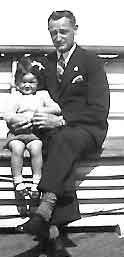
Aged three, I am pictured with my father Tom Mann, on the deck of the boat which went to Tasmania (and which also came back to Melbourne again)
When I was two and a half Mum and Dad and Lester took me to Tasmania for a holiday. And here is my first recollection, walking about on a ship, saying 'rockety rockety' while all about me people are throwing up from sea sickness. What a hated and hateful child I must have been. Do I remember that? Or is it that I visualise what I hear and was told that story so often over the years? Lester doesn't mention this at all in his diaries except to say he was seasick.
The Meeting of the Teetotallers
Mum and Dad met on a train on their way to go hop picking in 1937. I think they were going to Eurobin in Victoria. The interesting irony here was that hops are used to make beer and Mum and Dad were lifelong teetotallers. Mum was with her older sister, Valerie, and Dad was with his best friend, Amos Molloy. For years afterwards Valerie went to Waubra, near Lexton where Dad grew up, to visit Amos and his wife, and their friendship continued all their lives.
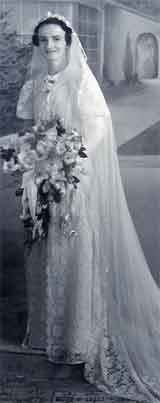
My mother, Merlyn Dudley, on her wedding day, April 8 1939
Mum and Dad married on April 8 1939 in Brunswick, a Melbourne suburb. Dad joined the RAAF three years later on April 10 1942. I'm not sure when they went to live in Chloris Crescent but I know Mum was there in December 1943 when Lester went to live with his grandmother in Melbourne. At one time Mum and Dad lived in Lexton, (near Ballarat in Victoria), possibly with Dad's father, who died in May 1943. On several occasions Dad tried to join Lexton Shire as a machinery operator but missed out both times.
The second time he tried was in 1945/46 because Lester visited them at the remains of the old Mann house and he mentioned it in his diary. It was also during that visit that Lester and Mum wandered through the Lexton cemetery with me and met Dad afterwards. During the walk I toddled along behind the adults carrying a little bottle. At the other end I no longer had the bottle. My family searched around hundreds of graves and finally found that bottle - on the grave of my grandparents.
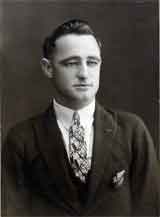
This is a studio portrait of the young Tom Mann
We Move to the New Old House
A few days after peace was declared in August 1945 my parents moved a couple of blocks from the boarding house to an old house at 4 Flowers Street, South Caulfield. Lester wrote, 'The house is old and unnattractive behind a high hedge but the large yard, the freedom from Mrs Russell (than whom the old man, who will be retaining a room could not be worse), the freedom for Diana'.
I must have lived my first seven or so years in a mental daze. I had no recollection of any old men living in our house and in 2000, a piece of paper came my way that showed the house had been sold to my parents by a Mr Dando. I mentioned this on the telephone to Lester. He said Mr Dando had lived with us for the first five years of my life, yet I had no recollection of him. I assume he would have lived in the big bedroom behind mine, which I remember as being empty until I was about eleven when my grandmother came to stay for a few weeks every few months.
Lester said Mr Dando was an uncle of our next door neighbour, Mrs Robinson. Our yards were divided by a huge hedge of hops! My teetotal parents just couldn't get away from the stuff, and as this was in the Melbourne suburbs, and I have never seen another hedge like it, I would assume the Robinsons may at one time have made use of the hops.
We lived very simply in the Flowers Street house which had a fascinating garden that Dad, the destroyer, eventually razed so it became like every other suburban anal retentive garden complete with dead straight concrete edging. Mum and Dad saved every penny for their new house which was to replace the old one a decade later. If I had lived in that old house in the USA it would have been referred to as a shotgun house because you could fire a bullet from the front door and it would zoom down the passage and out the back door to plough across an enclosed concreted area and into the wall of a fernery made out of crisscrossed thin pieces of timber, which I now remember is called lattice.
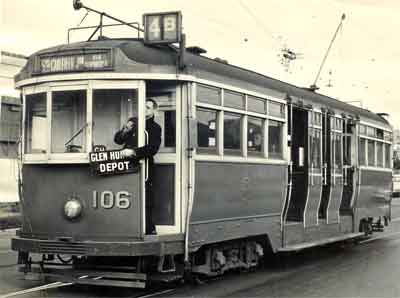
Tom Mann driving a Melbourne tram
Oddly enough I don't remember much about the contents of that area but I do remember my mother singing to me there and the song she sang was 'The monk, monk', something about a monkey and a chimpanzee and marriage. That was also where I remember our first cat who went by the brilliant name of Mother Cat. One assumes she had kittens and perhaps my own first cat, Snowball, was an offspring. Snowball was a lovely name but only a few parts of my cat were white, mostly she was a motley shading of blacks and greys. My second cat bore the imaginative name of Snowball The Second. And now I know the song was called Aba Daba Honeymoon - many thanks to Denis McCarthy (who is also a former student of Brighton High School and who also lives in Mackay) and also for sending me the following.
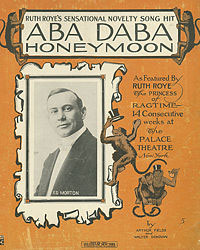
The song I had forgotten
The house bore a bronzy name plate, Kingsley. I never knew what Kingsley referred to but our house was the only one in Flowers Street to have a name, not that it was the best house, in fact it was the second worst, but to me it was paradise with a huge side yard and a huge back yard.
All about A Stable but not that One
In one corner was an old stable with a large concrete trough, no doubt used to store horsefeed, and next to it was a falling-down garage. There was an enclosed rose garden although I don't remember any blooms, and other fences bisected the yard covered with grape vines.The place was a forest and included a yellow plum tree the like of which I have never seen again. There is a photograph of the tree covered in blossom and there, somewhere, is Diana. Other trees included a fig, a giant almond tree, red plum trees, and apple trees, and a front hedge of huge hydrangeas. The hedge was around 18-20 feet high and was impossible to see through.
The place was a wonderland until Dad took up his trusty axe. George Washington had nothing on my father.The only things he didn't touch was the huge plum tree and the apple trees which produced delightfully bitter apples, the only apples I ever enjoyed. He did away with the huge almond tree, fig tree, all the roses, and a grape arbour.
Within a few years he had cleared the block, including the stable and the garage, and even the front half of our house. We had the kitchen, bathroom and a large newly built room which housed beds for Mum and Dad, my brother, Dale, and myself. I don't know how long we lived like that but I do know we were there when I was 11 and had just had a tonsillitis operation during my xmas holidays at the end of grade six. I was furious my holidays were used in such a fashion and even more furious when the promised icecream and lemonade, something I rarely saw, hurt my throat like hell. I'd been conned.
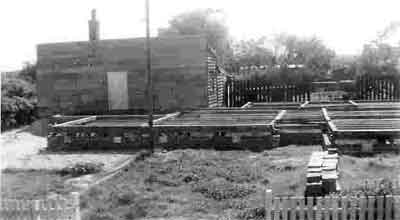
Construction begins on the new house in front of the remains of the old one
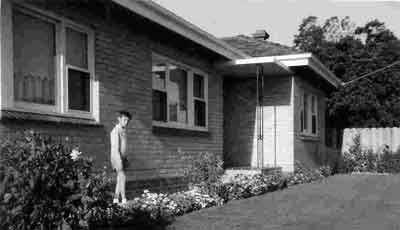
My brother, Dale, aged about seven is in front of the new house at 4 Flowers Street, South Caulfield
Random Thoughts
I can clearly remember the first story I ever told myself. I was about three and was obviously a deprived child. I pretended I lived in a chocolate house filled with chocolate furniture and my story consisted of eating everything.
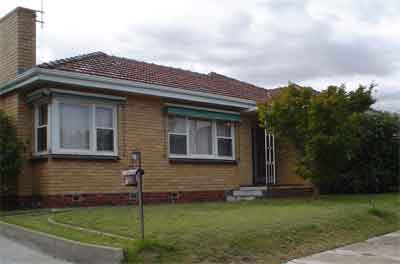
It's defences are down, 4 Flowers Street in 2005
Through all my childhood Lester always visited on Thursday evening after he finished work at the Repatriation Department, (later Veteran's Affairs), and again on Sunday afternoon and evening. He always brought chocolate with him, usually a block of peppermint cream and a block of raisins and nuts. My mother would break these up and put them in a bowl and there it sat, on the card table, while they played cards. Every now and then I would be allowed to have a piece. That bowl of chocolate haunted me. I often used to think that when I grew up I would buy blocks and blocks of chocolate and eat them all at once. And what happened? I grew up but I hardly ever want chocolate. I can stash a block in the freezer and maybe six months later might finish it. (Since I wrote that I realise I still have chocolate in my fridge which dates from four years ago. It is still quite edible after I take to it with a hammer as it melted into a giant block in the boot of my car on my way home all that time ago. I don't have incredible willpower, I simply prefer tomatoes, olives (stuffed with anchovies), and cheese.
Many thanks to Isabel!
- Links to more information about Diana
- About
- Teen Years
- Music
- Books
- Just Me and the Kids
- Secret of the Tower Room
- Volunteering